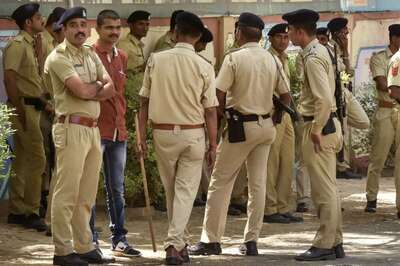
views
New Delhi: The Special Centre for Disaster Research (SCDR) and National Institute of Disaster Management at Jawaharlal Nehru University (JNU) has released its report, titled 2018 Kerala Floods: Governance and Legal Compliance', on Kerala floods and blamed the state government for unpreparedness.
The research team visited and surveyed the four worst affected areas — Alappuzha, Idukki, Kottayam and Pathanamthitta. These four districts covered 20 talukas and closely interacted with 11 talukas which were worst affected in terms of damages and losses both in property, non-human and human.
A travel was undertaken through the fragile zones of Western Ghats in September 2016. A team of researchers, which had been working on the environmental devastation and community resilience in Kerala since 2016, said in the report: “Such a calamity was not a surprise, but what was surprising was the lack of preparedness, the intransigence of administrative authorities and the neglect of panchayats including people living in villages.”
Environmentalist Madhav Gadgil, in a 2011 report on saving the Western Ghats, had also alleged that manmade factors such as unchecked quarrying had contributed to the disaster.
Vindicating Gadgil’s report, the JNU researchers said, “Kerala’s prime resource to sustainable progress passes through its highly rich and pristine ecology. The government has acted against nature, environment and ecosystems so unique to Kerala. One disaster could push Kerala to many years behind.”
The SCDR is a new academic research Centre at JNU and is also the first trans-disciplinary research Centre. The report has been prepared by professor Amita Singh, faculty at the Centre for the Study of Law and Governance, Dr Sunita Reddy, assistant professor at the Center of Social Medicine and Community Health, and Dr Manika Kamtham and Dr Gaurika Chugh research scholars, Study of Law and Governance.
The team was divided according to themes and reached the areas where no government assistance reached. The survey concluded on September 11, in which it was found that the “government has been very ill-prepared to encounter a disaster. Dam safety regulations assisted by flood inundation maps and early action plan were ignored. The O&M Manuals of 61 completed dams were not prepared. Such a casual handling of people’s lives and an irresponsible release of water led to devastating deluge.”
There are lobbies which govern Kerala, and it was responsible for the disaster, the report said, adding: “The fragile zones are under big estate owners who are not only controlling hills and forests but also mangroves which is Kerala’s strongest wall against coastal disasters.”
The team observed that since hills are concretised and constructed upon river catchments, backwaters and estuaries provide mangroves and livelihood to a large fisher folk community. They said the post-disaster affects are fatal, as the quantum gush of dam water blasted the aquifers and now all fresh drinking water flows into the ocean and is lost. “With the top soil lost and aquifers blasted out, water table has already started sinking down by almost 4 to 5 feet in the Allapuzha upper Kuttunad region,” the report highlighted.
Experts told JNU researchers that the future of Kerala is “scary” with “increasing symptoms of drought and lower productivity”. The growth rate could fall lower than 2 per cent as predicted by experts interviewed, said the report.
“There is no policy of a coordinated preparedness with other government departments which can extend to relief work if disaster strikes. Government had been absent from providing relief or even disbursing an amount as low as Rs 10,007 promised by the chief minister (Pinarayi Vijayan) as an ex gratia interim grant to affected households. With a more of 12.5 per cent above 65 years population constituted of further vulnerable sections like single women disabled and children who need special care were not provided for.”
Accusing the Kerala government of abusing human ethics, the researchers from JNU mentioned in the report, “The most heartrending abuse of human ethics as instructed through Article 48 A and Article 51 A of the Indian Constitution and DMA 2005 was the manner in which Kerala government watched the brutal death and drowning in captivity of their animals – birds in the cages, leashed pets at home, stray on the road, and pristine wildlife which has fed the tourism industry including religious tourism, in the state since the time when Kerala had no industry or technology to earn from.”
“The Early Warning systems were non-existent and as people shared, they would go off after the ceremonial installation and newspaper publicity and photographs. Floods have a great dependence on early warning to people for timely evacuation. Despite the CAG Reported warning the EWS were neither repaired nor was the private company indicted for completing agreed maintenance, said the report.
All through the report, the researchers maintained that Kerala flood disaster was manmade and blamed the land use policy for it. “The land use policy has been handled with greed and negligence. The fragile land act 2003 was dumped as an outdated law which has lost its relevance. This threw open construction over the whole of the Western Ghat hills in Kerala, triggering more disaster,” the report said.




















Comments
0 comment